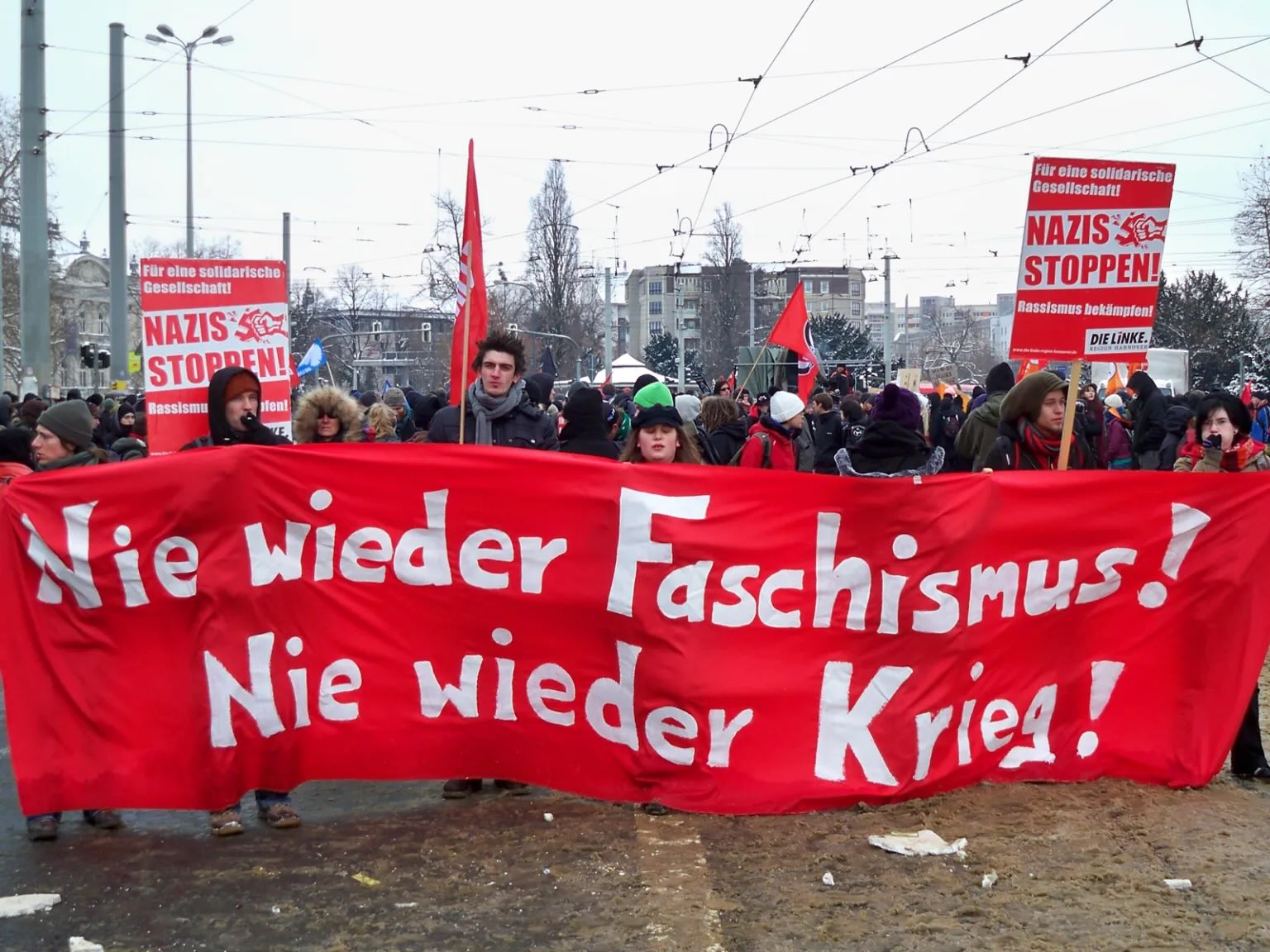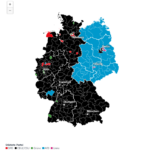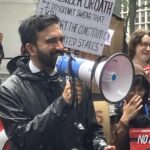Folko Mueler
Posted September 8, 2025

Socialism 2025 had a session on “Showdown in Germany” about the Left Party and its anti-fascist work. The presenter was Volkhard Mosler, a leading member of marx21, who talked about the role his revolutionary organization has played in (and outside) the Left Party. I am from the same town as the speaker and worked with him years ago. I found his talk and the discussion it generated helpful in outlining the growth of fascist organizing and resistance to it.
The presentation began with a brief overview of the history of post-WWII fascism in Germany. Mosler highlighted the continued presence of high-ranking former Nazi officials in the 1950s and 1960s in politics, the military apparatus, business, and even the judicial system. Their influence fueled the backlash against the student movement in the late 1960s, a movement which he himself was part of.
Mosler also provided brief descriptions of the country’s main “Nazi” parties prior to the rise of the Alternative for Germany (AfD).
- The National Democratic Party of Germany (NPD, as it is known by its German acronym) was founded in 1964 as a merging of several smaller far-right organizations. Although it was the political pole of attraction for the far right, it failed to clear the 5 percent hurdle in federal elections. In its heyday of the late 1960s it obtained 4.3 percent and won representation in a number of states, but was then unable to repeat their success until the 2004 election in Saxony.
- The Republicans (“Die Republikaner”) was founded in the early 1980s. Similar to the AfD, this party started out as a “Euro-skeptic” party. It soon drifted far right, after Franz Schönhuber, a former voluntary member of the Waffen SS, took over the reins. He was their undisputed leader from the mid-1980s to the mid-1990s. Ironically, it was in the 1989 election for the European Parliament that the party had its only electoral success, winning six seats.
- While not a political party per se, the Patriotic Europeans Against the Islamization of the West (PEGIDA – as it’s known by its German acronym) is a fiercely xenophobic and anti-Muslim group that has documented ties with street-fighting elements and has been able to organize sizable rallies and marches. It was founded in Dresden around the same time as the AfD.
Mosler then fast-forwarded to the meteoric rise of the latest far-right party, AfD, which was founded only 12 years ago. It has been represented in the European Parliament since 2014 and in the federal parliament since 2017. It has also had massive success in the state elections, in particular in the eastern German states. In the 2024 election, it won a whopping 32.8 percent in Thuringia.
Thuringia is the chosen “home” state of Björn Höcke, who represents the far-right wing of the party. While his “Flügel” (wing) was dissolved and he himself was threatened with expulsion from the party, he is still one of the most powerful figures in the AfD. As Mosler remarked, if you want to get things done in the party, there is no way around Höcke,
Mosler mentioned the importance of the infamous secret meeting of leading AfD members with the CDU’s (conservative party) “Werte-Union” faction, medium-sized company entrepreneurs and Martin Sellner, the ideologue and strategist of the “Identarian Movement” in Austria. This took place in Potsdam on November 25, 2023. (See A dark moment in contemporary German history.)
The main subject of the meeting was “re-migration” or deporting people with a migratory background — regardless of whether they had obtained German citizenship or not — as soon as the AfD would assume power.
This meeting was infiltrated by investigative journalists, whose reporting led to a huge backlash with mass demonstrations across Germany that ranged from tens to hundreds of thousands of participants. (See Never again is right now!)
Mosler emphasized that this new anti-fascism is predominantly directed at racism for racism’s sake. That is, it is not driven by the usual left anti-fascists, but by relatively apolitical but concerned citizens, most of whom had never before attended a demonstration. This anti-fascism has no issue with restrictive immigration policies or consistent deportations. He was therefore distinguishing also between an “eliminatory” racism, which this group would be opposed to, while not necessarily rejecting other forms of individual or structural racism.
A Growing Alternative
Mosler then shifted his talk to the unexpected success story of Die Linke in the most recent general election. (See Anti-fascists are the firewall: Reflections on the German snap election 2025.) This occurred after Sarah Wagenknecht left the party and began her own, which did poorly in the election.
With this departure, Die Linke was able to overcome the infighting and begin to consolidate and grow, due primarily to the massive influx of young people.
Ironically, just prior to that election, Mosler’s group, marx21, experienced a three-way split over whether staying in Die Linke still made sense. Here Mosler noted his rediscovered appreciation for patience.
A representative of one of the splinter groups, “Revolutionary Left” was also present at the talk and challenged Mosler and his group for staying in the reformist party.
While I found that contribution to be somewhat annoyingly sectarian, Mosler’s rebuttal made the point that marx21 is free to work both inside and outside Die Linke, and no party official has tried to rein in its revolutionary politics.
The main success story of marx21 is its anti-fascist work. Mosler highlighted two important events he had helped to coordinate:
- A big counter-demo in Dresden in the early 2000s, which attracted thousands of participants. Dresden is a bit like what Nuremberg or Munich was for the original Nazis. It is sort of a “Hauptstadt der Bewegung” or capital of the fascist movement. Dresden is a veritable hotbed, with annual Nazi marches. It’s the city where PEGIDA was founded.
- At the January 2025 AfD convention in Saxony, thousands of people blocked some of the access roads and delayed the meeting’s start by several hours.
Marx21 concentrates on developing its anti-fascist work as well as its trade-union work. It has a core of healthcare workers and has been able to coordinate that work in a number of hospitals.




Leave a Reply